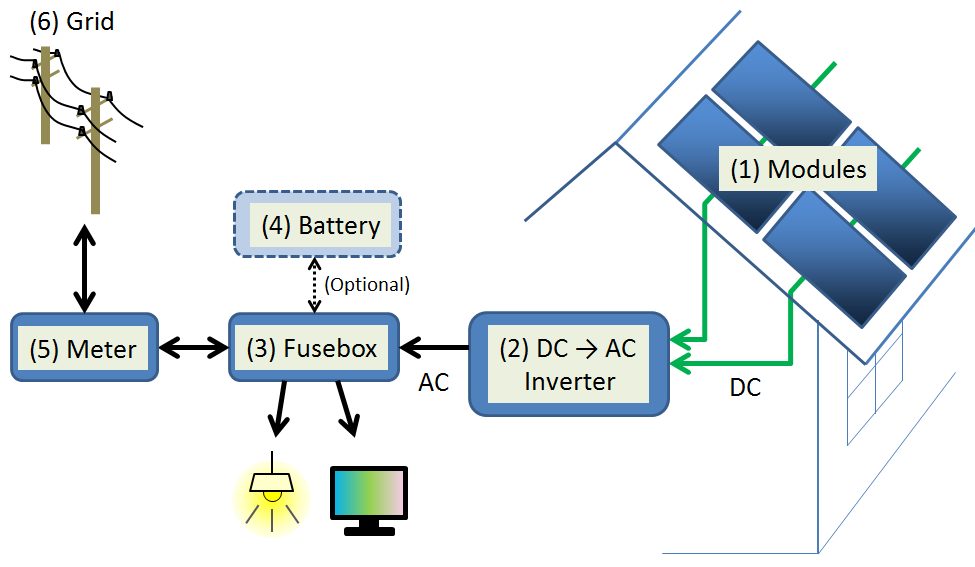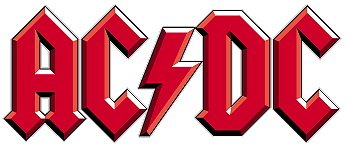Many people who are interested in solar power are also interested in technology.
And not just solar technology. But also anything having to do with renewable energy, from electric cars to experimental turbines for wind or water power to solar-powered roadways.
A lot of these technologies are still in the lab and won’t be on the market for years or decades to come. Other neat energy tech is available now, even for home use. Just take the cool solar gadgets on our Christmas list from last year.
Of course, if you’re interested in solar, you’re probably going to be interested n0t just in the hot technologies of tomorrow but in the well developed equipment that makes home solar systems run today.
Parts of a Solar Power System
 Everybody knows that you need solar panels, also known as photovoltaic or PV modules, to generate electricity from the sun.
Everybody knows that you need solar panels, also known as photovoltaic or PV modules, to generate electricity from the sun.
You may have also heard that you need a few other pieces of equipment to make a rooftop solar system work, including racking to attach the PV panels to your roof or plant them in your backyard, wires to connect your solar system to your house and to the electrical grid and even some software, including a system to monitor the electricity that your system produces.
But the part of a solar power system that many Virginia homeowners don’t think about may be the system’s most crucial single component.
The inverter has been called the “brain of a solar system” but it doesn’t get the respect it deserves. Here, I’m going to tell you why inverters are so important. Then, I’ll tell you about the three different types of inverters you can get with your home solar system. Finally, I’ll give you advice on choosing the best one for your situation.
Why Inverters Matter So Much
As the brain of a solar energy system, the inverter helps all the other parts of the system work together effectively. The inverter also helps connect a solar system to the electrical grid.
Most appliances, from TVs and computers to lights, refrigerators and microwave ovens, run off of a kind of electricity called alternating current, or AC power. By contrast, solar panels convert sun into a different type of electricity, direct current or DC power.
You don’t have to be an electrician or a physicist to understand that to make DC solar power useful to run AC appliances, you need to convert DC power to AC power. If you didn’t do this conversion, but instead just ran DC solar power straight into your home’s electrical sockets, it would blow out all your appliances. And nobody would want that.
It’s odd that appliances weren’t just built originally to use DC power, so you wouldn’t need to do any conversion. But since the early days of commercial electricity, appliances were constructed to require alternating current. Why? There’s a fascinating bit of history there.
 And it goes back further than the 1970s, when a hard rock and blues rock band in Australia was named AC/DC, later known for such hits as “Back in Black” and “Dirty Deeds Done Dirt Cheap.”
And it goes back further than the 1970s, when a hard rock and blues rock band in Australia was named AC/DC, later known for such hits as “Back in Black” and “Dirty Deeds Done Dirt Cheap.”
It actually started at the end of the 1800s, when two giants of invention, Thomas Edison and Nikola Tesla, battled over which type of electricity would power the appliances of the future. Edison wanted DC, which was his company’s favored technology and this put him in a battle with Tesla who wanted AC, as Explain That Stuff! says:
Edison tried all kinds of devious ways to convince people that AC was too dangerous, from electrocuting an elephant to (rather cunningly) supporting the use of AC in the electric chair for administering the death penalty. Even so, Tesla’s system won the day and the world has pretty much run on AC power ever since.
Since small-scale generators produce DC power, you need some way to convert that to AC for use in appliances. And that’s where inverters come in.
Types of Solar Inverters
All inverters work the same way, converting DC to AC power. But three basic types of inverters can be used in solar power systems, depending on the particulars of the system:
- String Inverters. The most common type of inverter is a single centralized unit that converts the DC power from all the solar panels in an array, connected together in “strings.” This tried-and-true technology is usually the least expensive option but it can reduce the amount of energy available from a solar energy system. As EnergySage explains, ‘If your system uses a string inverter, it will only produce as much useful electricity as its least productive solar panel. Electricity production for a system with a string inverter can “bottleneck,” or be dramatically reduced, if just one or two panels are in the shade or aren’t operating properly.’
- Microinverters. An alternative that’s more expensive but may offer higher performance is to use one small inverter connected to each solar panel. Not only can that deliver more power but it can also help to diagnose any problems with individual panels. But adding microinverters to each panel can really raise the cost of a solar system. And they take more maintenance than a conventional string inverter.
- Power Optimizers. A compromise that can be more efficient than a string inverter and less expensive than microinverters. Like microinverters, power optimizers are attached to every solar panel. But they’re a simpler technology. They do monitor the performance of each panel and improve its output. But they don’t convert DC to AC power. Instead, they send the optimized DC power to a traditional string inverter, helping to improve overall system efficiency.
How to Choose the Best Inverter
Along with running your PV system, inverters also send data to the monitoring app that can display a chart of solar power production on your phone or laptop. That’s probably the best point of contact for most solar homeowners with their inverter.
Otherwise, inverters are a pretty technical subject. If tech is your thing, you can read more about how inverters work. For example, this Australian website talks about the advantage of different inverter technologies.
But if you don’t have a burning desire to drill down into the working of inverters, don’t worry. Any experienced solar installer in Virginia can help. They can evaluate your location, suggest the best place to put solar panels, and then give you the best recommendation on an inverter technology that will give you the best value, balancing performance with cost.
That’s what we do every day at Main Street Solar. If you’d like to know more, just ask us to come by and look at your place and give you a free quote.
— Andrew Brenner, Main Street Solar





